Piano lessons can be a rewarding and enriching experience for children of all ages. But what is the best age to start piano lessons? There is no one-size-fits-all answer, as the ideal age to start will vary depending on the individual child’s cognitive, physical, and emotional development.
However, there are some general guidelines that can help parents make an informed decision about when to start their child with piano lessons. In this article, we will discuss the benefits of starting piano lessons at an early age, as well as some of the factors to consider when making this decision.
Age Range for Optimal Learning
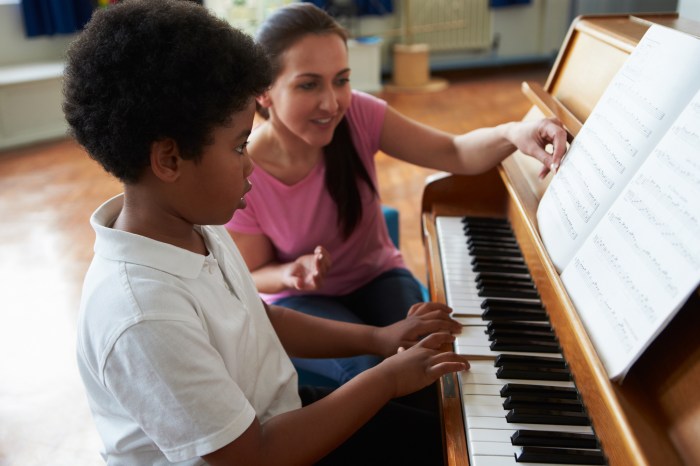
Research indicates that the ideal age range to commence piano lessons is between six and eight years old. During this period, children exhibit a harmonious balance of cognitive and physical development, enabling them to effectively grasp musical concepts and cultivate their dexterity on the instrument.
Cognitive Development
At around age six, children’s cognitive abilities undergo a significant transformation. They develop enhanced attention spans, improved memory, and heightened problem-solving skills. These advancements provide a solid foundation for understanding musical notation, rhythm, and the intricacies of piano playing.
Physical Development
Concurrently, children’s physical development progresses at a steady pace. Their fine motor skills, including finger coordination and strength, reach a level that facilitates the precise movements required for playing the piano. Additionally, their overall coordination and posture improve, enabling them to maintain proper playing posture and avoid physical strain.
Cognitive Benefits
Learning piano at an early age offers numerous cognitive advantages that can have a lasting impact on a child’s development. Studies have shown that music education enhances brain functions related to memory, attention, and problem-solving.Playing the piano requires the coordination of multiple senses, including hearing, touch, and vision.
This multisensory stimulation helps strengthen neural connections and improves cognitive processing. The act of reading and interpreting musical notation also exercises the brain’s ability to focus and sustain attention.
Improved Memory
Engaging with music stimulates the hippocampus, a brain region crucial for memory formation and retrieval. Playing the piano involves memorizing melodies, rhythms, and chords, which strengthens memory pathways and improves overall recall.
Enhanced Attention Span
Learning to play the piano requires sustained focus and concentration. The act of practicing and performing music helps develop attentional control, allowing children to stay focused for longer periods and resist distractions.
Problem-Solving Skills
Playing the piano often involves overcoming technical challenges and interpreting musical ideas. This process encourages children to think critically, solve problems, and find creative solutions. The ability to navigate musical complexities translates to improved problem-solving skills in other areas of life.
Physical Benefits
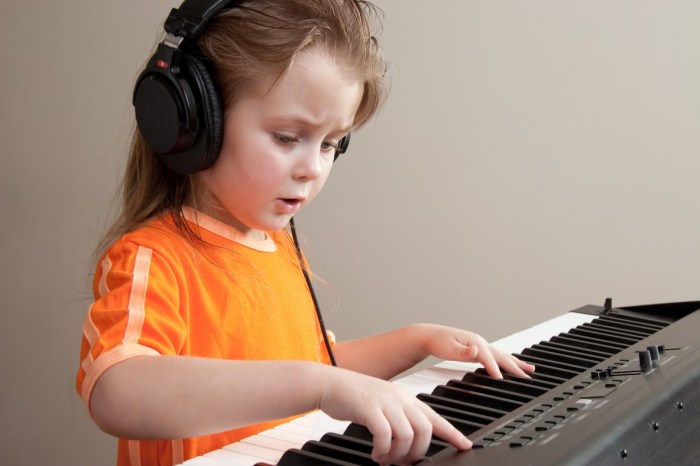
Piano playing offers numerous physical benefits, enhancing coordination, motor skills, and posture.
The intricate movements involved in playing the piano foster hand-eye coordination. The player’s eyes must constantly scan the sheet music while their hands execute complex fingerings, improving their ability to process visual information and translate it into precise physical actions.
Fine Motor Skills
The repetitive and delicate movements of the fingers on the piano keys refine fine motor skills. These movements strengthen the muscles in the fingers, wrists, and forearms, improving dexterity and precision in other areas of life.
Posture
Proper piano playing requires maintaining good posture, with the spine straight, shoulders relaxed, and elbows at the correct height. This helps develop body awareness and improves overall posture, reducing the risk of back pain and other musculoskeletal issues.
Social and Emotional Development
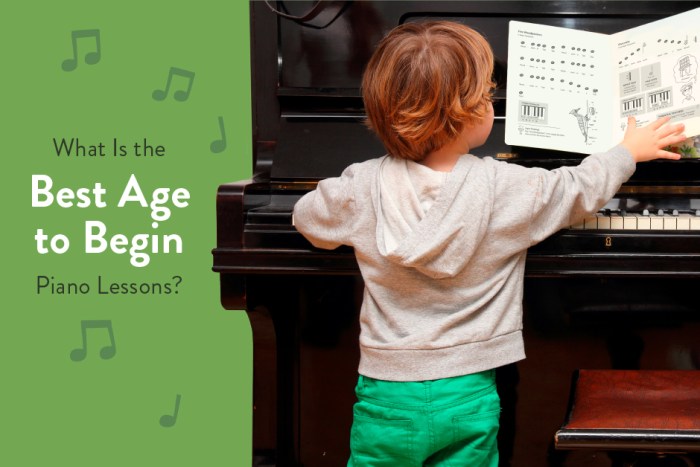
Piano lessons offer a range of social and emotional benefits that contribute to a child’s overall well-being. These include:
- Increased Confidence: Learning to play the piano requires patience, perseverance, and a belief in one’s abilities. As children progress, they gain a sense of accomplishment and pride in their musical abilities, which translates into increased confidence in other areas of their lives.
- Improved Self-Discipline: Piano lessons instill discipline and self-control. Children learn the importance of regular practice, following instructions, and working towards goals. This discipline extends beyond the piano and helps them develop better habits in other areas, such as academics and personal relationships.
- Enhanced Creativity: Piano lessons encourage creativity and self-expression. Children learn to interpret musical pieces, develop their own compositions, and explore different musical styles. This fosters their imagination and helps them develop a unique artistic voice.
Long-Term Commitment
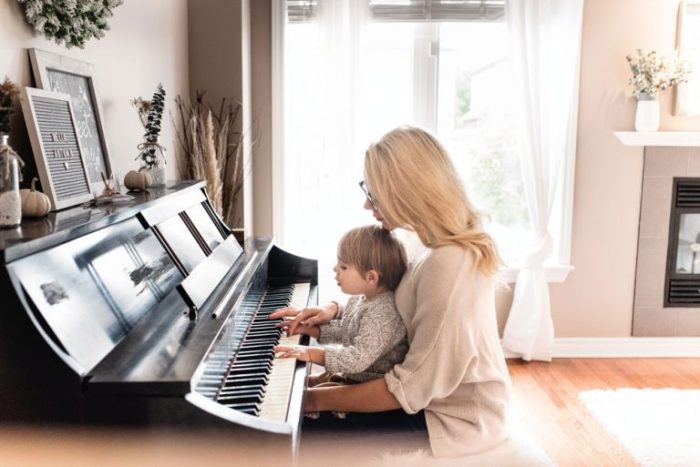
Embarking on piano lessons is a journey that requires dedication and perseverance. Long-term commitment plays a pivotal role in unlocking the full potential of learning this instrument. It fosters progress, deepens understanding, and enhances the overall enjoyment of the musical experience.
Consistent practice and regular lessons provide the necessary foundation for developing proficiency. With each session, students build upon their existing knowledge, refine their technique, and expand their repertoire. This gradual progression leads to a profound understanding of musical concepts and the ability to express oneself through the piano.
Benefits of Long-Term Commitment
- Accelerated Progress: Consistent practice and regular lessons enable students to make steady progress, mastering concepts and techniques at a faster pace.
- Enhanced Comprehension: Long-term engagement allows students to delve deeper into musical theory, understanding the intricacies of chords, scales, and rhythms.
- Increased Fluency: Regular practice develops muscle memory and coordination, leading to increased fluency and dexterity in playing the piano.
- Greater Enjoyment: As students progress, they experience a growing sense of accomplishment and enjoyment, which fuels their motivation to continue learning.
Parental Involvement
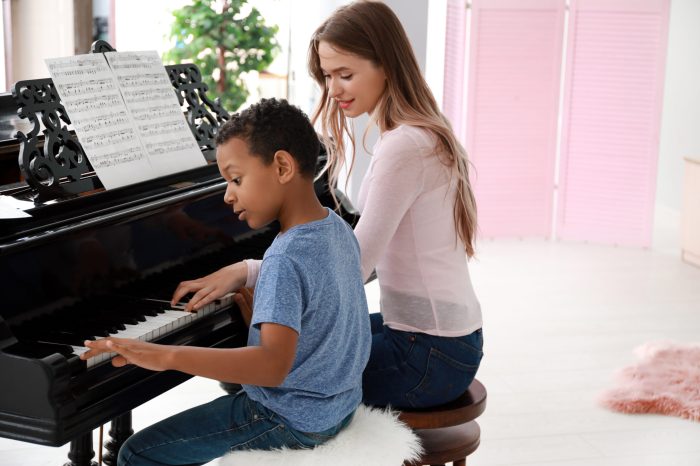
Parental involvement plays a crucial role in supporting a child’s piano journey. Their encouragement, practice supervision, and attendance at lessons are invaluable.
Encouragement
Parents should provide consistent encouragement to their child, regardless of their progress or mistakes. Positive feedback and praise can boost a child’s confidence and motivation.
Practice Supervision
Regular practice is essential for progress. Parents can help by setting a practice schedule, providing a quiet practice space, and supervising practice to ensure proper technique and focus.
Attending Lessons
Attending lessons with your child allows you to observe their progress, ask questions, and provide support. This demonstrates your interest and commitment, which can motivate your child.
Choosing a Qualified Teacher
Finding a qualified piano teacher is crucial for a child’s musical journey. Here’s how to assess a teacher’s qualifications:
Credentials:
- Music degree from an accredited institution
- Certifications in piano pedagogy
- Membership in professional organizations (e.g., Music Teachers National Association)
Experience:
- Years of teaching experience
- Specialization in teaching children
- Testimonials from previous students
Teaching Style:
- Patient and encouraging
- Adapts lessons to the child’s learning style
- Creates a positive and engaging learning environment
Assessment and Planning:
- Assesses the child’s readiness and musical aptitude
- Develops a tailored learning plan based on the child’s abilities
- Regularly monitors progress and adjusts lessons accordingly
Communication:
- Communicates clearly with the child and parents
- Provides regular updates on the child’s progress
- Open to feedback and collaboration
Setting Realistic Expectations
Setting realistic expectations is crucial for piano lessons. Avoid putting excessive pressure or causing discouragement by recognizing that progress takes time and effort. Establish achievable goals and celebrate small milestones to maintain motivation.
Managing Expectations
* Encourage regular practice and patience in skill development. – Avoid comparing progress to others, as everyone learns at their own pace. – Focus on enjoyment and the intrinsic rewards of playing music. – Celebrate successes, no matter how small, to boost confidence.
Special Considerations
Piano lessons can be enriching for children with learning disabilities or physical challenges. With adaptations, they can experience the joy of music and reap its benefits.
Learning Disabilities
For children with learning disabilities, such as dyslexia or ADHD, piano lessons can enhance cognitive skills, improve focus, and boost self-esteem. Consider the following adaptations:
- Break down lessons into smaller chunks: Divide complex concepts into manageable segments, allowing for better comprehension.
- Use visual aids: Charts, diagrams, and color-coding can help reinforce learning and cater to visual learners.
- Provide extra time for practice: Allow students more time to master concepts at their own pace, reducing frustration.
- Incorporate multi-sensory activities: Engage multiple senses through activities like playing rhythms on a drum or singing while playing.
- Encourage collaboration: Pair students with peers who can provide support and different perspectives.
Physical Challenges
For children with physical challenges, such as limited mobility or visual impairments, piano lessons can be adapted to accommodate their needs:
- Use assistive technology: Specialized keyboards, software, and adaptive devices can make playing the piano accessible.
- Modify hand positions: Adjust fingerings and posture to accommodate physical limitations, ensuring comfort and accessibility.
- Incorporate adapted exercises: Design exercises that focus on specific movements and coordination, improving dexterity and musicality.
- Provide tactile feedback: Use raised keys or textured surfaces to provide sensory cues for visually impaired students.
- Collaborate with occupational therapists: Seek guidance from occupational therapists to develop exercises that enhance fine motor skills and coordination.
Success Stories
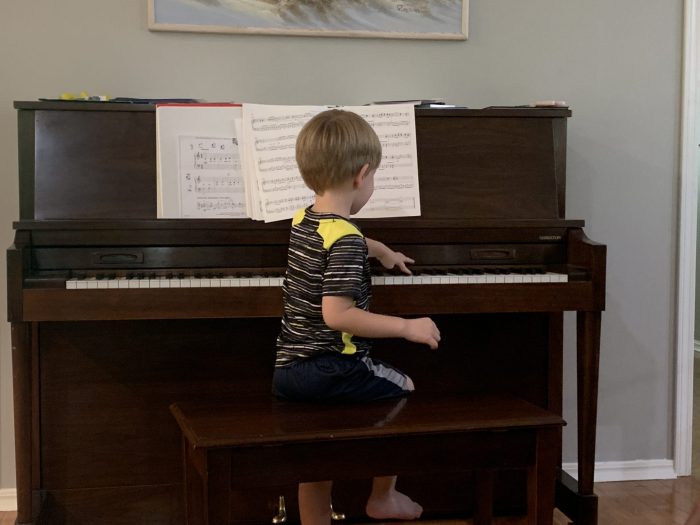
Piano lessons at a young age can unlock a world of musical possibilities. Throughout history, countless individuals have embarked on their musical journeys at a tender age, achieving remarkable accomplishments that have left an indelible mark on the world of music.
These success stories serve as a testament to the transformative power of early piano education.
Prodigies of the Piano
Among the most celebrated piano prodigies is Wolfgang Amadeus Mozart, who began taking lessons at the age of four. By the time he was six, he had composed his first piano concerto. Other notable young virtuosos include Franz Liszt, Frédéric Chopin, and Ludwig van Beethoven, all of whom started playing piano before the age of ten.
Contemporary Successes
In recent years, young pianists continue to astound audiences with their exceptional talent and artistry. For instance, 12-year-old Lydian Nadhaswaram became the youngest person to win the prestigious Van Cliburn International Piano Competition in 2022. Similarly, 15-year-old Haochen Zhang won the Gold Medal at the International Tchaikovsky Competition in 2019.These
success stories demonstrate that starting piano lessons at a young age can provide a solid foundation for a lifelong love of music and the potential for extraordinary achievements in the musical realm.
Last Word
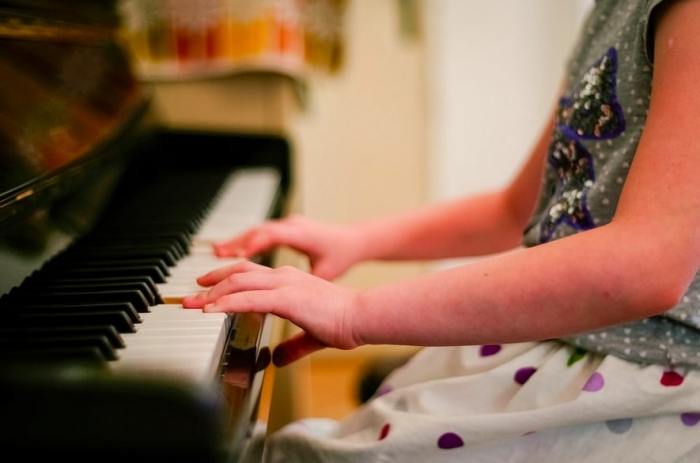
Ultimately, the decision of when to start piano lessons is a personal one. There is no right or wrong answer, and the best age to start will vary depending on the individual child. However, by considering the factors discussed in this article, parents can make an informed decision that will help their child get the most out of their piano lessons.
Q&A
What are the benefits of starting piano lessons at an early age?
There are many benefits to starting piano lessons at an early age. Some of the most well-documented benefits include improved cognitive function, enhanced physical development, and increased social and emotional well-being.
What are some of the factors to consider when deciding when to start piano lessons?
Some of the factors to consider when deciding when to start piano lessons include the child’s cognitive development, physical development, and emotional maturity. It is also important to consider the child’s interests and motivation.
How can I find a qualified piano teacher?
There are a few things to look for when choosing a qualified piano teacher. First, make sure that the teacher has experience teaching children. Second, ask about the teacher’s teaching methods and philosophy. Finally, make sure that the teacher is someone who your child feels comfortable with.